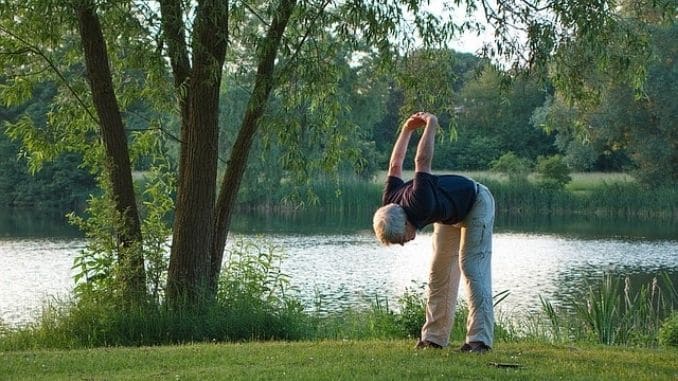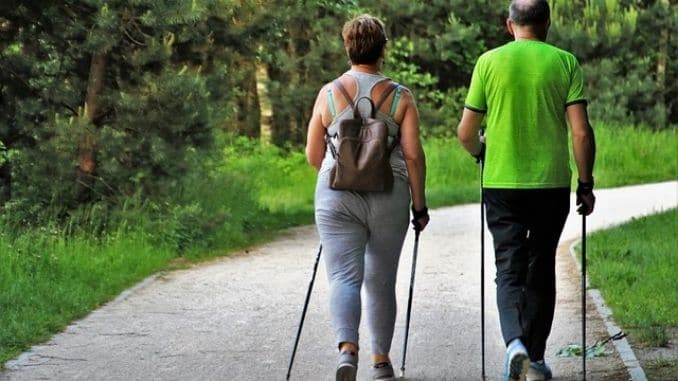
The statistics surrounding Alzheimer’s disease and dementia are frightening.
Alzheimer’s Disease International states that someone in the world develops dementia every three seconds. In 2015, there were an estimated 46.8 million people living with dementia, rising to close to 50 million in 2017. By 2030, it’s expected that the disease will affect about 75 million people.
The good news is that we are discovering lifestyle habits that can help reduce the risk of cognitive decline. You may already be doing daily puzzles or taking supplements in the hopes of keeping your brain sharp.
According to several studies, however, there may be one thing you can do that is more effective than any other when it comes to maintaining brain health: exercise.
Lifestyle Habits Can Help Keep Your Brain Healthy
In 2017, the Lancet Commission on Dementia Prevention, Intervention, and Care reported that 35 percent of dementia cases — as many as one in three — could be preventable through lifestyle factors. According to their findings, you can reduce your risk of dementia by addressing the following:
- Mid-life hearing loss: Hearing loss in midlife was associated with an almost twofold increased risk of dementia. Hearing loss can be corrected with hearing aids.
- Lack of secondary education: Low educational levels can make you more vulnerable to cognitive decline. Lifelong learning, on the other hand, is associated with improved brain health.
- Smoking: Cigarette smoke contains highly toxic chemical compounds that can increase the risk of dementia. Quitting, on the other hand, reduces it.
- Depression: Depression can increase risk of dementia because it causes a number of negative changes in the brain, increasing stress hormones, decreasing levels of healthy proteins and shrinking the hippocampus, which is critical for memory. Getting treatment for depression can help.
- Physical inactivity: A sedentary lifestyle increases the risk of cognitive decline, but regular exercise reduces it.
- Social isolation: As people age, they often lose touch with friends and family and can end up feeling isolated and alone, which increases the risk of brain problems. Maintaining social contacts is good for mental health.
- Midlife hypertension: High blood pressure is bad for the heart, and it’s bad for the brain too. Studies have shown that it can increase the risk of both Alzheimer’s disease and another type of dementia called vascular dementia. People who manage their hypertension have a lower risk of dementia and a higher cognitive function overall.
- Midlife obesity: People who are obese at midlife have a greater risk of dementia than those who have a healthy body weight in middle age. A normal body mass index (BMI), however, is associated with lower levels of the plaques and tangles that signal Alzheimer’s.
- Type 2 diabetes: People with diabetes have an up to 73 percent increased risk of dementia and an even higher risk of developing vascular dementia than nondiabetics. Managing and preventing diabetes can help keep the brain sharp and functioning optimally.
A different study published in Alzheimer’s & Dementia: The Journal of the Alzheimer’s Association showed that lifestyle changes can help reduce the risk of dementia. In response to the results, the Alzheimer’s Association (AA) published “10 Ways to Love Your Brain,” which included tips to reduce the risk of cognitive decline.
Many of the recommendations were the same as those above, although the AA listed regular aerobic exercise as number one, noting that several studies had found an association between physical activity and reduced the risk of dementia. They also suggested eating a healthy diet, avoiding brain injury, challenging the brain and getting enough sleep.
Exercise Stands Out as a Powerful Dementia Prevention Tool
In 2018, researchers at the Department of Cardiology at Hartford Hospital in Hartford, Connecticut, analyzed data from 19 studies that examined the effects of exercise in seniors at risk for dementia. The analysis included more than 1,100 seniors who had a parent diagnosed with Alzheimer’s or who already had mild cognitive impairment.
Results showed that cognitive function in participants who engaged only in the aerobic exercise was three times better than in participants who did a combination of aerobics and muscle-strengthening exercises. Overall, those who did any type of exercise fared better than those who didn’t exercise at all. The sedentary participants experienced a slight cognitive decline.
There have been a number of other studies showing that aerobic exercise is key when it comes to protecting the brain. In 2006, researchers found that three or more days of exercise a week could stave off dementia in people aged 65 and older.
Exercising at midlife can also have a major impact. The results of 11 studies, for instance, showed that regular exercise in middle-aged participants reduced the risk of developing dementia later in life by about 30 percent and reduced the risk of Alzheimer’s in particular by 45 percent.
In one particular study, researchers followed more than 2,000 men for 35 years. They looked specifically at five behaviors:
- Regular exercise
- Not smoking
- Moderating alcohol intake
- Maintaining a healthy body weight
- Eating a healthy diet
They found that of all these, regular exercise had the greatest effect in terms of reducing dementia risk. The other factors were helpful too — those who followed all five were up to 60 percent less likely to develop dementia.
Exercise can even improve your brain’s response in the short term. A review of 29 studies showed that healthy adults who engaged in aerobic exercise for a month or more experienced improvements in memory, attention and processing speed when compared to nonaerobic exercisers who engaged in stretching and toning.
10 Best Exercises for Brain Health
Although scientists don’t know all the ways that exercise acts on the brain, they do know that it improves blood flow, stimulates the release of hormones that repair brain cells and helps keep blood pressure within normal levels.
One recent study found something else interesting — older adults with poor fitness levels had more deterioration in the white matter of their brains, compared with their fitter peers. White matter acts as the communication center and is associated with decision-making and other important functions. Those who regularly exercised also scored better on tests of critical thinking and planning skills.
Based on all these findings, it’s clear that aerobic exercises like those listed below are likely to help you reduce your risk of dementia later in life. To get the best brain-boosting results, most research suggests you work out for at least 30 minutes or more several times a week.
1. Running
As long as you don’t have to worry about the impact on your joints, running remains one of the best types of aerobic exercise you can do. You don’t need any special equipment — except a good pair of running shoes — and you can do it anywhere you happen to be, even up and down the stairs at a hotel or office building.
If you are concerned about joint health, try running on softer surfaces like grass and dirt to reduce the impact on your knees and hips. It also helps to alternate between running and other types of aerobic exercise to give your joints a rest.
2. Swimming
This is the best low-impact form of aerobic exercise. The water supports your weight, so your joints remain undamaged while your heart gets a good workout. Simply floating in the pool won’t get you the effects you need, though. Try swimming laps, playing a game or engaging in water aerobics.
3. Cycling
This is another good option for those struggling with joint pain as it’s a low-impact form of aerobic exercise. You can get your blood pumping easily while cycling and, if you add a few hills on your route. You’ll be even more likely to enjoy an aerobic workout. Cycling is also a great activity to do with family and friends and can keep those social ties strong.
4. Fast Walking
Exercises to Help You Reduce Your Risk of Dementia: Walking is easier on your joints than running, and it’s another easy exercise option that requires nothing but your two legs. A leisurely stroll won’t be enough to qualify as aerobic, however. You’ll need to walk fast and walk for 45 minutes to an hour to enjoy the brain-boosting benefits. If you add a few hills or obstacles to your route, all the better.
5. Jumping Rope
Exercises to Help You Reduce Your Risk of Dementia: This is a great one if you spend all day in an office. Also, if you want to squeeze in a few minutes of aerobic exercise between your other tasks. You can keep a jump rope at your desk, at home, in the car, and in your suitcase. Then pull it out whenever you have 10 to 20 minutes and jump.
Do adjust the rope for your height — you should be able to stand with both feet on the middle of the rope and extend the handles to your armpits. If it’s too long, cut or tie it to reduce the length, as a rope that is too long can increase the risk of tripping. Then make sure you turn the rope with your wrists and land softly.
In addition to jumping in place, you can also take the rope along with you on a walk or jog and alternate your pace now and then with some rope skips. Remember that you don’t have to go at it too hard. Jumping rope at a normal speed is an aerobic exercise.
6. Cardio Machines
Exercises to Help You Reduce Your Risk of Dementia: If you have a gym membership, you have access to a number of aerobic machines, including the elliptical trainer, treadmill, cross-country skiing machines, stair steppers, and rowing machines. Alternating your use can help you work different muscles as you keep your heart rate up.
7. Dance or Step Aerobics
If you’d rather stay home to work out, dance and step aerobic DVDs and streaming programs can be great options. These are often fun to do and keep your brain active as you learn the steps. There are many available so that you can change it up when you want to. Which may help you to stick with your exercise program.
A dance class may also qualify as an aerobic activity if the dance is vigorous enough to get your heart rate up. Classes also present opportunities to be social, so your brain enjoys the benefits of both exercise and social interaction.
8. Tennis or Racquetball
When you’re playing a sport you enjoy, it doesn’t feel like exercise, so these may be the best options of all. Both qualify as aerobic exercises. As they keep you moving and a game usually lasts for at least 30 minutes, if not longer. Because you’re moving both your arms and your legs, it will be easy to get your heart rate up, and you’ll be having fun at the same time.
9. Zumba
Exercises to Help You Reduce Your Risk of Dementia: Zumba and other similar types of exercise offered at the gym ― like spin classes and cardio kickboxing ― are aerobic exercises and, as such, are beneficial for heart and brain health. They also help tone the body and improve coordination. Make sure you wear supportive shoes and keep yourself hydrated through the class.
10. Hiking
Perhaps the best option in the warmer months, hiking is similar to climbing stairs, in that there is usually at least some sort of incline involved. However, hiking is not as hard on your joints as stair climbing is as the inclines usually vary, and the surface you’re walking on is usually softer.
In addition to getting your heart pumping, hiking exposes you to nature — which has its own health benefits — and tones the muscles in your legs, buttocks, and abdomen. It also tends to reduce mental stress and improve your mood, so get out as often as you can.
If you are looking for an all-natural system that promotes optimal brain health quickly, then check out the 14-Day Brain Health Quick Start Program.








